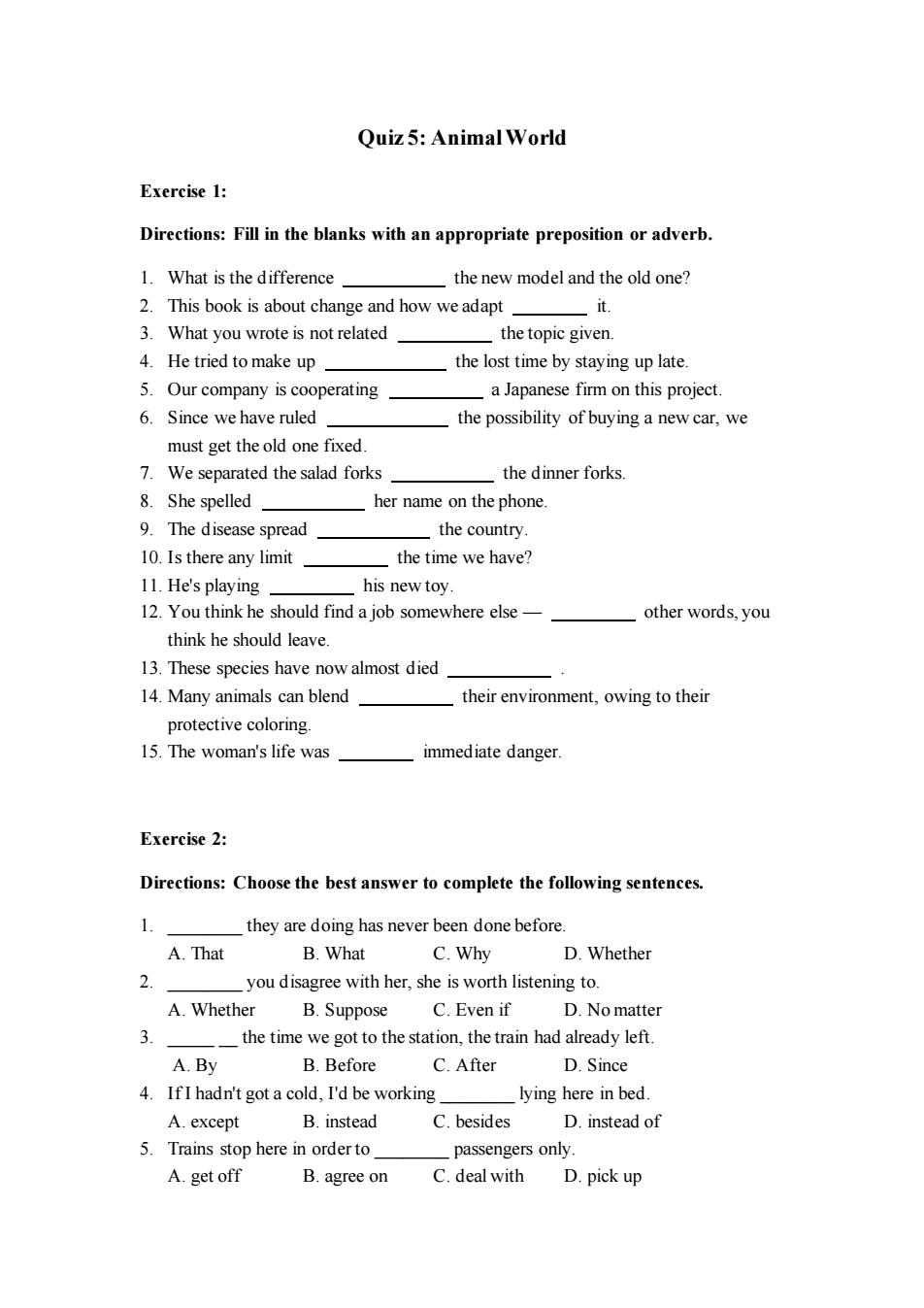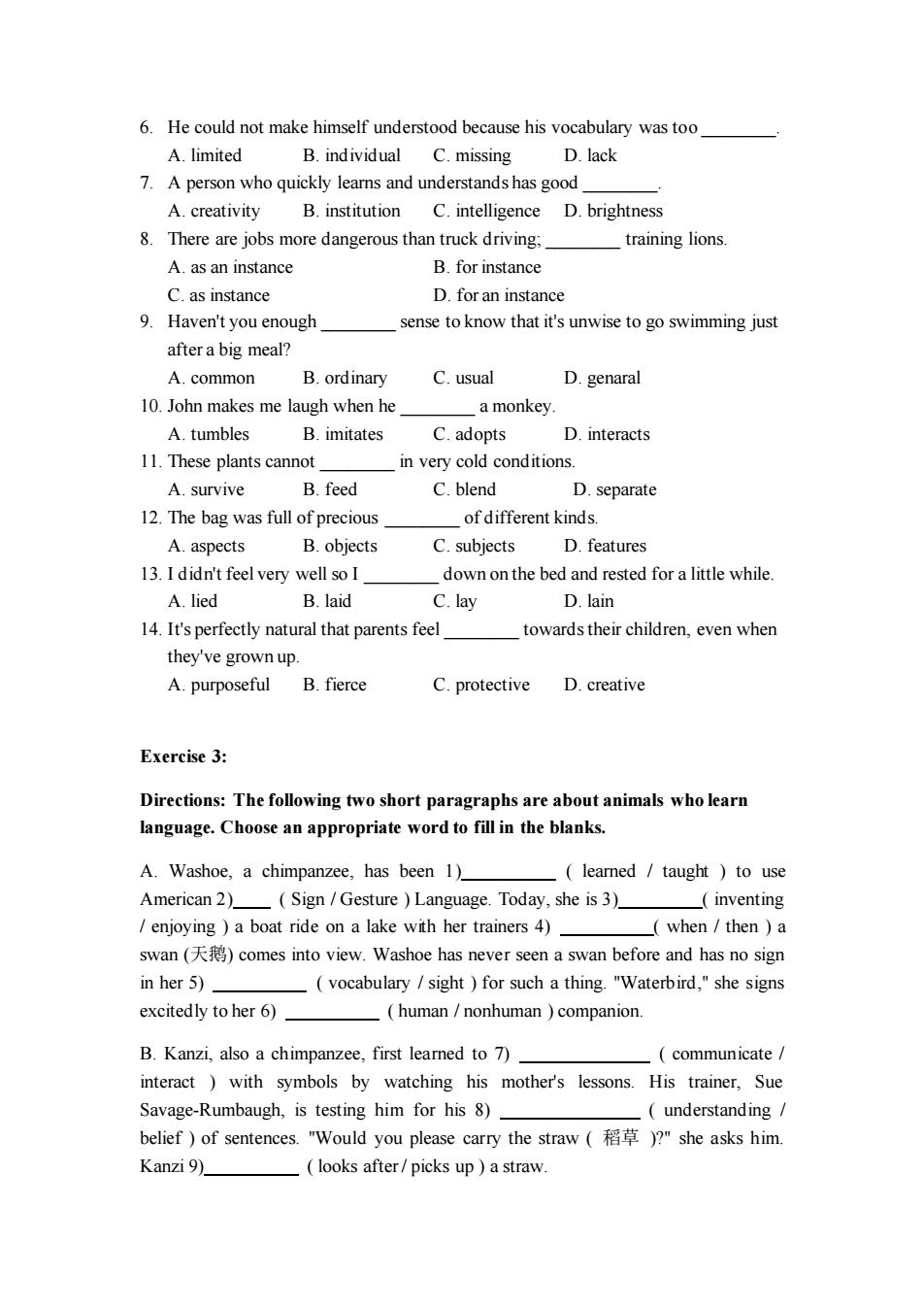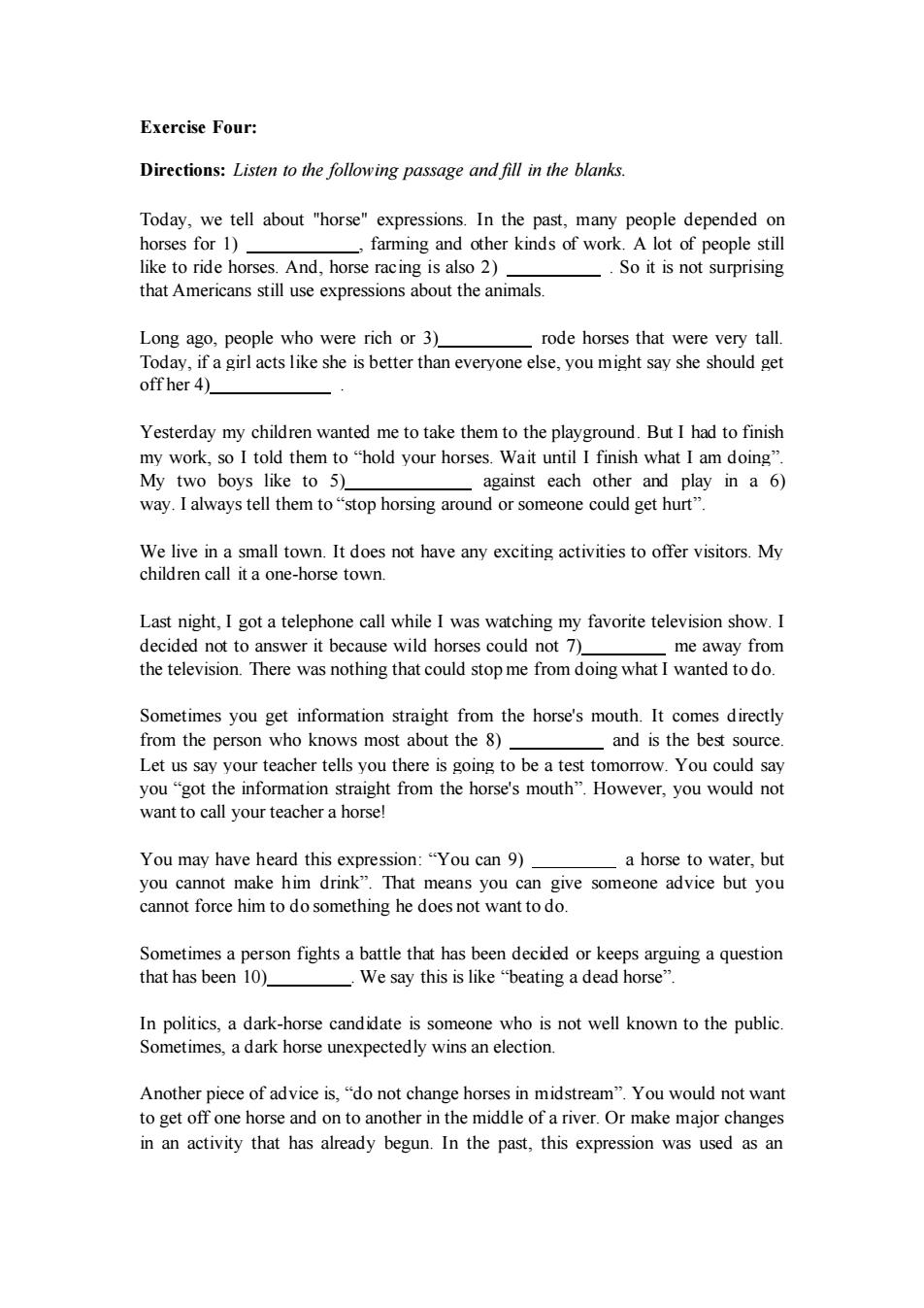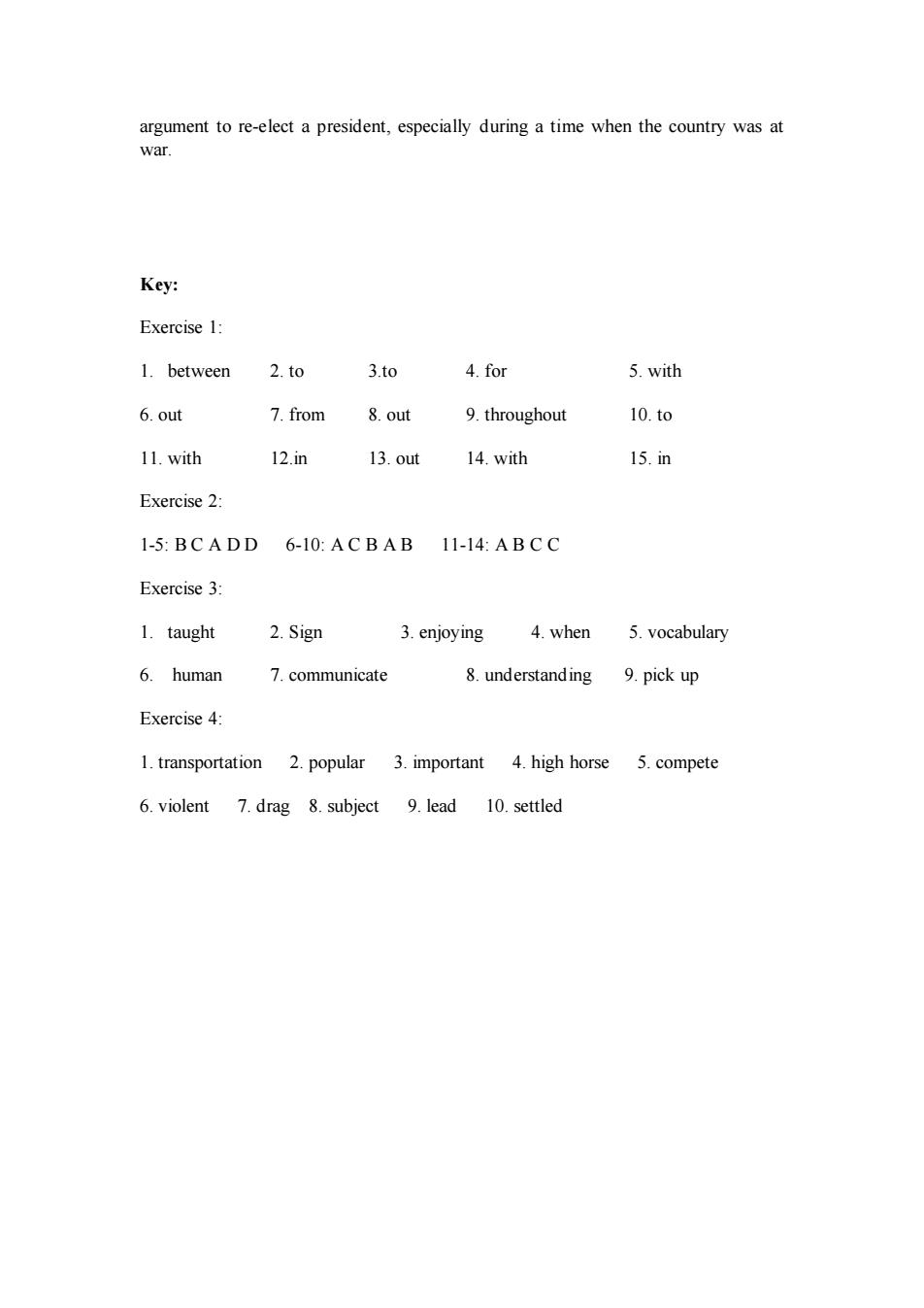
Quiz 5:Animal World Exercise 1: Directions:Fill in the blanks with an appropriate preposition or adverb. 1.What is the difference the new model and the old one? 2.This book is about change and how we adapt it. 3.What you wrote is not related the topic given. 4.He tried to make up the lost time by staying up late 5.Our company is cooperating a Japanese firm on this project 6.Since we have ruled the possibility of buying a new car,we must get the old one fixed. 7.We separated the salad forks the dinner forks. 8.She spelled her name on the phone. 9.The disease spread the country. 10.Is there any limit the time we have? 11.He's playing his new toy. 12.You think he should find a job somewhere else- other words,you think he should leave. 13.These species have now almost died 14.Many animals can blend their environment,owing to their protective coloring. 15.The woman's life was immediate danger. Exercise 2: Directions:Choose the best answer to complete the following sentences. 1. they are doing has never been done before. A.That B.What C.Why D.Whether 2 you disagree with her,she is worth listening to. A.Whether B.Suppose C.Even if D.No matter 3. the time we got to the station,the train had already left. A.By B.Before C.After D.Since 4.If I hadn't got a cold,I'd be working lying here in bed. A.except B.instead C.besides D.instead of 5.Trains stop here in order to_ passengers only. A.get off B.agree on C.deal with D.pick up
Quiz 5: Animal World Exercise 1: Directions: Fill in the blanks with an appropriate preposition or adverb. 1. What is the difference the new model and the old one? 2. This book is about change and how we adapt it. 3. What you wrote is not related the topic given. 4. He tried to make up the lost time by staying up late. 5. Our company is cooperating a Japanese firm on this project. 6. Since we have ruled the possibility of buying a new car, we must get the old one fixed. 7. We separated the salad forks the dinner forks. 8. She spelled her name on the phone. 9. The disease spread the country. 10. Is there any limit the time we have? 11. He's playing his new toy. 12. You think he should find a job somewhere else — other words, you think he should leave. 13. These species have now almost died . 14. Many animals can blend their environment, owing to their protective coloring. 15. The woman's life was immediate danger. Exercise 2: Directions: Choose the best answer to complete the following sentences. 1. ________ they are doing has never been done before. A. That B. What C. Why D. Whether 2. ________ you disagree with her, she is worth listening to. A. Whether B. Suppose C. Even if D. No matter 3. _____ __ the time we got to the station, the train had already left. A. By B. Before C. After D. Since 4. If I hadn't got a cold, I'd be working ________ lying here in bed. A. except B. instead C. besides D. instead of 5. Trains stop here in order to ________ passengers only. A. get off B. agree on C. deal with D. pick up

6.He could not make himself understood because his vocabulary was too A.limited B.individual C.missing D.lack 7.A person who quickly learns and understands has good A.creativity B.institution C.intelligence D.brightness 8.There are jobs more dangerous than truck driving; training lions. A.as an instance B.for instance C.as instance D.for an instance 9.Haven't you enough sense to know that it's unwise to go swimming just after a big meal? A.common B.ordinary C.usual D.genaral 10.John makes me laugh when he a monkey. A.tumbles B.imitates C.adopts D.interacts 11.These plants cannot in very cold conditions. A.survive B.feed C.blend D.separate 12.The bag was full of precious of different kinds. A.aspects B.objects C.subjects D.features 13.I didn't feel very well so I down on the bed and rested for a little while. A.lied B.laid C.lay D.lain 14.It's perfectly natural that parents feel towards their children,even when they've grown up. A.purposeful B.fierce C.protective D.creative Exercise 3: Directions:The following two short paragraphs are about animals who learn language.Choose an appropriate word to fill in the blanks. A.Washoe,a chimpanzee,has been 1) learned taught )to use American 2)(Sign/Gesture )Language.Today,she is 3)_ inventing enjoying )a boat ride on a lake with her trainers 4) when then )a swan comes into view.Washoe has never seen a swan before and has no sign in her 5) vocabulary /sight )for such a thing."Waterbird,"she signs excitedly to her 6) (human/nonhuman )companion. B.Kanzi,also a chimpanzee,first learned to 7) communicate interact )with symbols by watching his mother's lessons.His trainer,Sue Savage-Rumbaugh,is testing him for his 8) understanding belief of sentences."Would you please carry the straw )?she asks him. Kanzi 9) looks after/picks up )a straw
6. He could not make himself understood because his vocabulary was too ________. A. limited B. individual C. missing D. lack 7. A person who quickly learns and understands has good ________. A. creativity B. institution C. intelligence D. brightness 8. There are jobs more dangerous than truck driving; ________ training lions. A. as an instance B. for instance C. as instance D. for an instance 9. Haven't you enough ________ sense to know that it's unwise to go swimming just after a big meal? A. common B. ordinary C. usual D. genaral 10. John makes me laugh when he ________ a monkey. A. tumbles B. imitates C. adopts D. interacts 11. These plants cannot ________ in very cold conditions. A. survive B. feed C. blend D. separate 12. The bag was full of precious ________ of different kinds. A. aspects B. objects C. subjects D. features 13. I didn't feel very well so I ________ down on the bed and rested for a little while. A. lied B. laid C. lay D. lain 14. It's perfectly natural that parents feel ________ towards their children, even when they've grown up. A. purposeful B. fierce C. protective D. creative Exercise 3: Directions: The following two short paragraphs are about animals who learn language. Choose an appropriate word to fill in the blanks. A. Washoe, a chimpanzee, has been 1) ( learned / taught ) to use American 2) ( Sign / Gesture ) Language. Today, she is 3) ( inventing / enjoying ) a boat ride on a lake with her trainers 4) ( when / then ) a swan (天鹅) comes into view. Washoe has never seen a swan before and has no sign in her 5) ( vocabulary / sight ) for such a thing. "Waterbird," she signs excitedly to her 6) ( human / nonhuman ) companion. B. Kanzi, also a chimpanzee, first learned to 7) ( communicate / interact ) with symbols by watching his mother's lessons. His trainer, Sue Savage-Rumbaugh, is testing him for his 8) ( understanding / belief ) of sentences. "Would you please carry the straw ( 稻草 )?" she asks him. Kanzi 9) ( looks after / picks up ) a straw

Exercise Four: Directions:Listen to the following passage and fill in the blanks Today,we tell about "horse"expressions.In the past,many people depended on horses for 1) farming and other kinds of work.A lot of people still like to ride horses.And,horse racing is also 2) So it is not surprising that Americans still use expressions about the animals. Long ago,people who were rich or 3) rode horses that were very tall. Today,if a girl acts like she is better than everyone else,you might say she should get off her 4) Yesterday my children wanted me to take them to the playground.But I had to finish my work,so I told them to "hold your horses.Wait until I finish what I am doing". My two boys like to 5) against each other and play in a 6) way.I always tell them to"stop horsing around or someone could get hurt". We live in a small town.It does not have any exciting activities to offer visitors.My children call it a one-horse town. Last night,I got a telephone call while I was watching my favorite television show.I decided not to answer it because wild horses could not 7) me away from the television.There was nothing that could stop me from doing what I wanted to do. Sometimes you get information straight from the horse's mouth.It comes directly from the person who knows most about the 8) and is the best source. Let us say your teacher tells you there is going to be a test tomorrow.You could say you "got the information straight from the horse's mouth".However,you would not want to call your teacher a horse! You may have heard this expression:"You can 9) a horse to water,but you cannot make him drink".That means you can give someone advice but you cannot force him to do something he does not want to do. Sometimes a person fights a battle that has been decided or keeps arguing a question that has been 10).We say this is like "beating a dead horse". In politics,a dark-horse candidate is someone who is not well known to the public. Sometimes,a dark horse unexpectedly wins an election. Another piece of advice is,"do not change horses in midstream".You would not want to get off one horse and on to another in the middle of a river.Or make major changes in an activity that has already begun.In the past,this expression was used as an
Exercise Four: Directions: Listen to the following passage and fill in the blanks. Today, we tell about "horse" expressions. In the past, many people depended on horses for 1) , farming and other kinds of work. A lot of people still like to ride horses. And, horse racing is also 2) . So it is not surprising that Americans still use expressions about the animals. Long ago, people who were rich or 3) rode horses that were very tall. Today, if a girl acts like she is better than everyone else, you might say she should get off her 4) . Yesterday my children wanted me to take them to the playground. But I had to finish my work, so I told them to “hold your horses. Wait until I finish what I am doing”. My two boys like to 5) against each other and play in a 6) way. I always tell them to “stop horsing around or someone could get hurt”. We live in a small town. It does not have any exciting activities to offer visitors. My children call it a one-horse town. Last night, I got a telephone call while I was watching my favorite television show. I decided not to answer it because wild horses could not 7) me away from the television. There was nothing that could stop me from doing what I wanted to do. Sometimes you get information straight from the horse's mouth. It comes directly from the person who knows most about the 8) and is the best source. Let us say your teacher tells you there is going to be a test tomorrow. You could say you “got the information straight from the horse's mouth”. However, you would not want to call your teacher a horse! You may have heard this expression: “You can 9) a horse to water, but you cannot make him drink”. That means you can give someone advice but you cannot force him to do something he does not want to do. Sometimes a person fights a battle that has been decided or keeps arguing a question that has been 10) . We say this is like “beating a dead horse”. In politics, a dark-horse candidate is someone who is not well known to the public. Sometimes, a dark horse unexpectedly wins an election. Another piece of advice is, “do not change horses in midstream”. You would not want to get off one horse and on to another in the middle of a river. Or make major changes in an activity that has already begun. In the past, this expression was used as an

argument to re-elect a president,especially during a time when the country was at war. Key: Exercise 1: 1.between 2.to 3.to 4.for 5.with 6.out 7.from 8.out 9.throughout 10.to 11.with 12.in 13.0ut 14.with 15.in Exercise 2: 1-5:BCADD 6-10:ACBAB 11-14:ABCC Exercise 3: 1.taught 2.Sign 3.enjoying 4.when 5.vocabulary 6.human 7.communicate 8.understanding 9.pick up Exercise 4: 1.transportation 2.popular 3.important 4.high horse 5.compete 6.violent 7.drag 8.subject 9.lead 10.settled
argument to re-elect a president, especially during a time when the country was at war. Key: Exercise 1: 1. between 2. to 3.to 4. for 5. with 6. out 7. from 8. out 9. throughout 10. to 11. with 12.in 13. out 14. with 15. in Exercise 2: 1-5: B C A D D 6-10: A C B A B 11-14: A B C C Exercise 3: 1. taught 2. Sign 3. enjoying 4. when 5. vocabulary 6. human 7. communicate 8. understanding 9. pick up Exercise 4: 1. transportation 2. popular 3. important 4. high horse 5. compete 6. violent 7. drag 8. subject 9. lead 10. settled